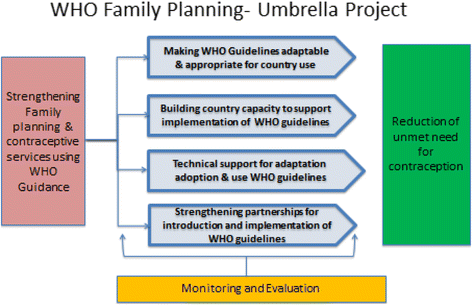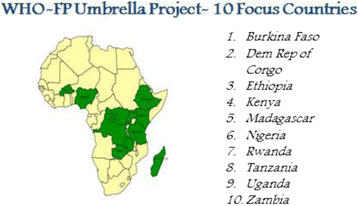Design and initial implementation of the WHO FP umbrella project- to strengthen contraceptive services in the sub Saharan Africa
- PMID: 28619067
- PMCID: PMC5472894
- DOI: 10.1186/s12978-017-0335-0
Design and initial implementation of the WHO FP umbrella project- to strengthen contraceptive services in the sub Saharan Africa
Erratum in
-
Correction to: Design and initial implementation of the WHO FP umbrella project- to strengthen contraceptive services in the sub Saharan Africa.Reprod Health. 2017 Nov 6;14(1):145. doi: 10.1186/s12978-017-0406-2. Reprod Health. 2017. PMID: 29110665 Free PMC article.
Abstract
Background: Strengthening contraceptive services in sub Saharan Africa is critical to achieve the FP 2020 goal of enabling 120 million more women and girls to access and use contraceptives by 2020 and the Sustainable Development Goals (SDG) targets of universal access to sexual and reproductive health (SRH) services including family planning by 2030.
Method: The World Health Organization (WHO) and partners have designed a multifaceted project to strengthen health systems to reduce the unmet need of contraceptive and family planning services in sub Saharan Africa. The plan leverages global, regional and national partnerships to facilitate and increase the use of evidence based WHO guidelines with a specific focus on postpartum family planning. The four key approaches undertaken are i) making WHO Guidelines adaptable & appropriate for country use ii) building capacity of WHO regional/country staff iii) providing technical support to countries and iv) strengthening partnerships for introduction and implementation of WHO guidelines. This paper describes the project design and elaborates the multifaceted approaches required in initial implementation to strengthen contraceptive services.
Conclusion: The initial results from this project reflect that simultaneous application these approaches may strengthen contraceptive services in Sub Saharan Africa and ensure sustainability of the efforts. The lessons learned may be used to scale up and expand services in other countries.
Keywords: Adaptation; Capacity building; Contraception; Health systems; Implementation; Partnerships; Sub-Saharan Africa; Sustainability; Unmet need; WHO family planning guidelines.
Figures
Similar articles
-
Reproductive health and family planning needs among HIV-infected women in Sub-Saharan Africa.Curr HIV Res. 2013 Mar;11(2):160-8. doi: 10.2174/1570162x11311020008. Curr HIV Res. 2013. PMID: 23432491 Review.
-
Towards achieving the family planning targets in the African region: a rapid review of task sharing policies.Reprod Health. 2021 Jan 23;18(1):22. doi: 10.1186/s12978-020-01038-y. Reprod Health. 2021. PMID: 33485339 Free PMC article. Review.
-
Availability of integrated family planning services in HIV care and support sites in sub-Saharan Africa: a secondary analysis of national health facility surveys.Reprod Health. 2019 May 29;16(Suppl 1):60. doi: 10.1186/s12978-019-0713-x. Reprod Health. 2019. PMID: 31138242 Free PMC article.
-
The strategic approach to contraceptive introduction.Stud Fam Plann. 1997 Jun;28(2):79-94. Stud Fam Plann. 1997. PMID: 9216029
-
Evaluating a LARC Expansion Program in 14 Sub-Saharan African Countries: A Service Delivery Model for Meeting FP2020 Goals.Matern Child Health J. 2017 Sep;21(9):1734-1743. doi: 10.1007/s10995-016-2014-0. Matern Child Health J. 2017. PMID: 27154524 Free PMC article.
Cited by
-
Access to quality contraceptive counselling among adolescent girls and young women in sub-Saharan Africa.Contracept Reprod Med. 2024 Apr 15;9(1):16. doi: 10.1186/s40834-024-00267-x. Contracept Reprod Med. 2024. PMID: 38622719 Free PMC article.
-
Scoping review protocol to map evidence on South-South learning exchange in family planning.BMJ Open. 2023 Mar 24;13(3):e061685. doi: 10.1136/bmjopen-2022-061685. BMJ Open. 2023. PMID: 36963799 Free PMC article.
-
Integrated delivery of family planning and childhood immunisation services in routine outreach clinics: findings from a realist evaluation in Malawi.BMC Health Serv Res. 2020 Aug 24;20(1):777. doi: 10.1186/s12913-020-05571-1. BMC Health Serv Res. 2020. PMID: 32838774 Free PMC article.
-
Enhancing the Introduction and Scale Up of Self-Administered Injectable Contraception (DMPA-SC) in Health Systems (the EASIER Project): Protocol for Embedded Implementation Research.JMIR Res Protoc. 2023 Aug 23;12:e44222. doi: 10.2196/44222. JMIR Res Protoc. 2023. PMID: 37610819 Free PMC article.
-
Interventions addressing impacts of climate change on sexual and reproductive health and rights in sub-Saharan Africa: A scoping review.PLoS One. 2025 Aug 11;20(8):e0329201. doi: 10.1371/journal.pone.0329201. eCollection 2025. PLoS One. 2025. PMID: 40788888 Free PMC article.
References
-
- Singh S, Darroch JE, Ashford LS. Adding it up: the costs and benefits of investing in sexual and reproductive health 2014. New York: Guttmacher Institute; 2014. https://www.guttmacher.org/sites/default/files/report_pdf/addingitup2014.... Last accessed on 02.01.2017.
-
- Ajong A.B, Njotang P.N., Yakum M.N., Essi M.J., Essiben F., Eko Eko F. et.al. 2016. Determinants of unmet need for family planning among women in urban Cameroon: a cross sectional survey in the Biyem –Assi health district, Yaounde. BMC Womens Health; 16(4): DOI: 10.1186/s12905-016-0283-9. https://www.ncbi.nlm.nih.gov/pmc/articles/PMC4949889/ Last accessed on 02.01.2017. - PMC - PubMed
-
- Nkosazana CDZ, Carlos L, Kaberuka D, Helen C. MDG report 2014: assessing progress in Africa toward the millennium development goals. Addis Ababa, Ethiopia: Economic Commission for Africa; 2014 http://www.afdb.org/fileadmin/uploads/afdb/Documents/Publications/MDG_Re... Last accessed on 02.01.2017.
-
- Ross, John A. and William L. Winfrey. 2001. Contraceptive use, intention to use and unmet need during the extended postpartum period. Int Fam Plan Perspect 27(1): 20–27. https://www.guttmacher.org/journals/ipsrh/2001/03/contraceptive-use-inte... Last accessed on 02.01.2017.
-
- Sedgh, Gilda and Rubina Hussain. 2014. Reasons for contraceptive non use among women having unmet need for contraception in developing countries. Studies in family planning 45(2): 151–169. http://onlinelibrary.wiley.Com/doi/10.1111/j.1728-4465.2014.00382.X/full Last accessed on 02.01.2017. - DOI - PubMed
MeSH terms
Grants and funding
LinkOut - more resources
Full Text Sources
Other Literature Sources
Medical



